Preventing Sexual Violence in Conflict Initiative strategy
Published 28 November 2022
Presented to Parliament by the Secretary of State for Foreign, Commonwealth & Development Affairs by Command of His Majesty: November 2022
© Crown copyright 2022 This publication is licensed under the terms of the Open Government Licence v3.0 except where otherwise stated.
Where we have identified any third party copyright information you will need to obtain permission from the copyright holders concerned.
This publication is available at www.gov.uk/official-documents.
Any enquiries regarding this publication should be sent to us at Communications Team, OSHR Directorate, Foreign, Commonwealth & Development Office, King Charles Street, SW1A 2AH
Foreword from the Foreign Secretary
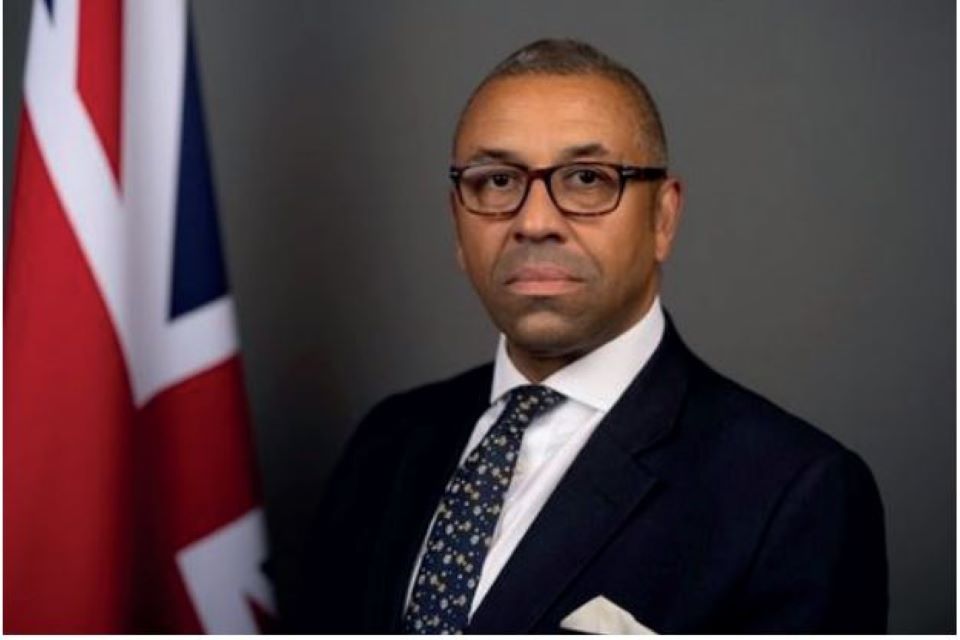
Sexual violence is a deeply inhumane and illegal tactic of warfare, shattering lives and scarring communities. As we launch this strategy, sexual violence continues in conflicts across the world, including in the Democratic Republic of the Congo, Syria and Myanmar. There is also mounting evidence of rape and other heinous crimes committed by Russian forces in Ukraine. The UK is working with the Ukrainian Government and the International Criminal Court to bring the perpetrators to justice.
Conflict-related sexual violence is a global scourge and the tragic reality is that impunity continues to be the norm. This is why the UK is at the heart of the international response. Since the launch of the Preventing Sexual Violence in Conflict Initiative (PSVI) in 2012 the UK has led the world in addressing these heinous crimes, including at the 2014 Global Summit.
Our international conference in London on preventing sexual violence in conflict is where together we will agree to further action. This includes launching a Political Declaration to send a message that conflict-related sexual violence must end and describe the steps needed to achieve this. I have also announced up to £12.5 million of new funding to tackle this issue.
Just as most of the world has united behind Ukraine in its fight for freedom, so we must come together in our response to these appalling crimes. The UK will pursue a new initiative dedicated to providing expertise and guidance to help national authorities uphold survivors’ rights and hold perpetrators to account.
In the end, this is about protecting the right of people to live their lives without fear. Those who commit appalling acts and threaten the security and dignity of women and girls must be held accountable. The shame is theirs, and theirs alone.
Together with our friends and partners, the UK will strive to achieve a fundamental shift in the global response to these crimes. By putting survivors first and ending impunity we can ease the appalling suffering wrought by sexual violence in conflict.
The RT Hon James Cleverly MP, Secretary of State for Foreign, Commonwealth and Development Affairs. 28 November 2022
Foreword from Lord Ahmad of Wimbledon, Minister of State and the Prime Minister’s Special Representative on Preventing Sexual Violence in Conflict
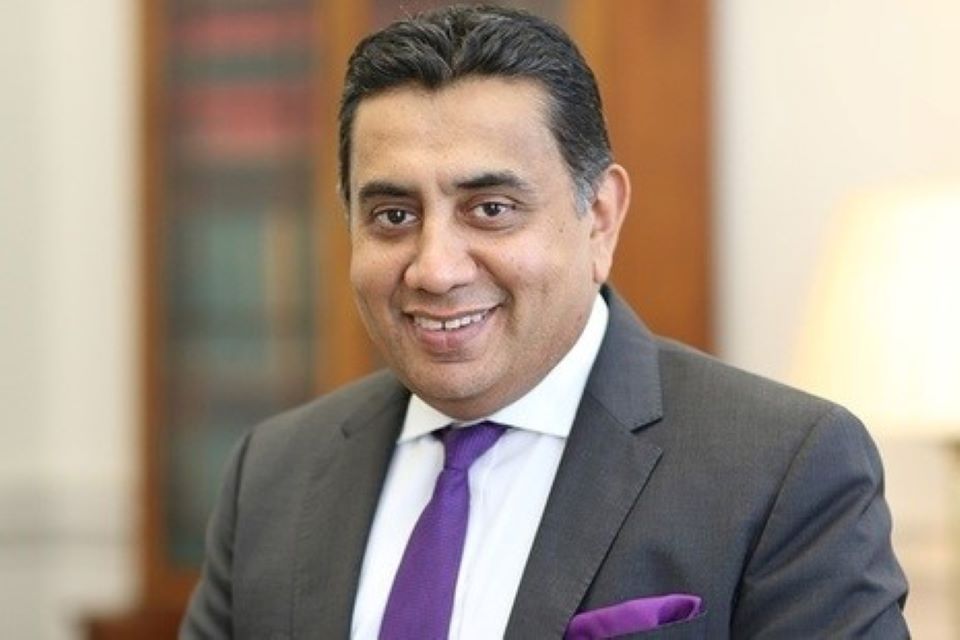
Conflict-related sexual violence (CRSV) leaves profound and lasting scars on survivors, their children and their communities. It ruins lives, destroys livelihoods and tears families apart.
As the Prime Minister’s Special Representative on Preventing Sexual Violence in Conflict, I have had the privilege of meeting courageous survivors from all over the world. Their determination to fight for justice and to rid the world of this scourge is truly inspiring, and I share their commitment.
Working with our friends and allies, I am determined to stamp out sexual violence in conflict, hold perpetrators to account and support survivors. The United Kingdom is a global leader in tackling these heinous acts, and recent events in Afghanistan, Ethiopia and Ukraine demonstrate that our work is as important now as it ever has been.
Though we are still a long way from achieving a world free from sexual violence, the Preventing Sexual Violence in Conflict Initiative (PSVI) has taken important strides towards this goal. Today we are convening global actors at the UK-hosted PSVI International Conference. We are using this important opportunity to review progress since the PSVI was launched 10 years ago, secure commitments from international partners and announce new ambitious work to drive further action.
Through our work with some incredible organisations, the UK has delivered vital support services to survivors across the globe. Since 2019, we have contributed £2.7 million to the Global Survivors Fund established by Nobel Laureates Nadia Murad and Dr Denis Mukwege, and I’m pleased to announce that we will be contributing up to £5.15 million further.
Over the past decade, we have trained over 17,000 police and military personnel. We have also deployed the UK Team of Experts more than 90 times to countries including Ethiopia, Bangladesh and Uganda, helping to build capacity within governments, and support the United Nations and NGOs.
We have contributed to building a rigorous global evidence base on what works to prevent gender-based violence by pioneering approaches around the world that have shown reductions in levels of violence against women and girls of around 50%, including in conflict-affected contexts.
In 2019, I appointed two PSVI Survivor Champions: Kolbassia Haoussou MBE and Nadine Tunasi. In 2020, I launched the Declaration of Humanity, with great support from His Excellency Archbishop Angaelos and a leading advocate of PSVI Jacqueline Isaac. This unites faith and belief leaders globally in a call to prevent sexual violence in conflict and denounce the stigma faced by survivors.
Last year, I launched the Call to Action to Ensure the Rights and Wellbeing of Children Born of Sexual Violence in Conflict. This was the first step towards supporting the tens of thousands of children who, due to the circumstances of their conception, can be marginalised and stigmatised by their families and communities.
In April 2022 I launched the Murad Code jointly with Nadia Murad at the UN Security Council. This UK-funded global code of conduct, developed by the Institute for International Criminal Investigations with support from Nadia’s Initiative and other partners, will ensure that the investigation and documentation of sexual violence crimes upholds survivors’ rights and prevents re-traumatisation.
I am grateful to our PSVI Steering Board who continue to provide invaluable advice. I also want to express my deep gratitude to HRH The Countess of Wessex who has demonstrated her commitment to this invaluable work through her direct engagement with survivors and in support of our efforts. This includes during our recent visit to the Democratic Republic of the Congo where we heard directly from survivors, activists and others about their inspiring work to put an end to conflict-related sexual violence.
Lord (TARIQ) Ahmad of Wimbledon, Minister of State for the Middle East, South Asia and the UN, Prime Minister’s Special Representative on Preventing Sexual Violence in Conflict. 28 November 2022
Executive summary
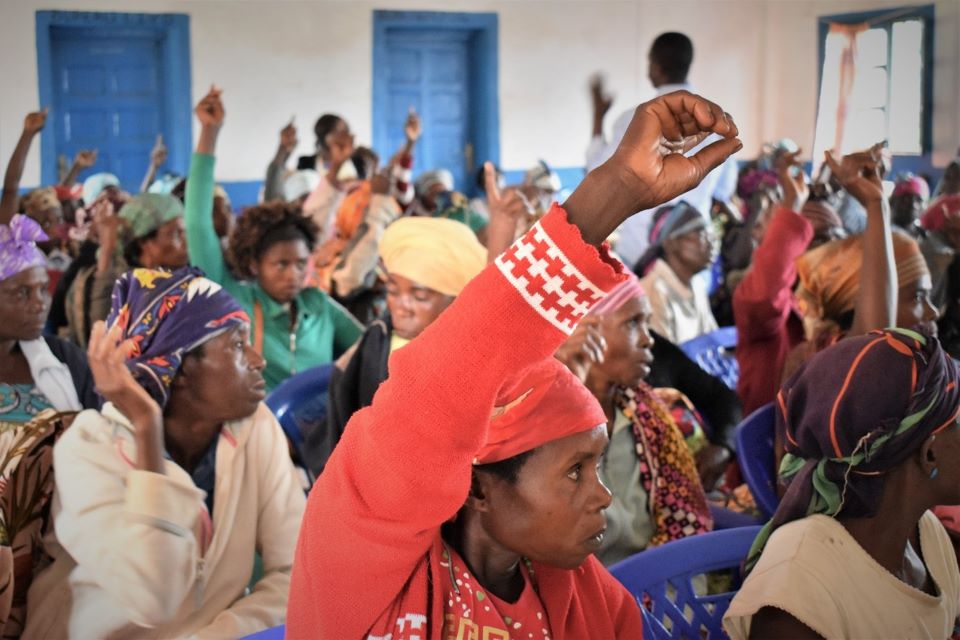
GSF workshop in the Democratic Republic of the Congo, Kaniola, 2020 © Panzi Foundation
The global scale of conflict-related sexual violence (CRSV) is appalling. We need a stronger international response for all those affected, the vast majority of whom are women and girls. Progress has been made to support survivors and strengthen accountability, but sexual violence continues to be used in conflict-affected areas on a shocking scale, and impunity continues to be the norm for perpetrators. Reports of CRSV in Ukraine are deplorable and the unprecedented international response creates a vital opportunity to turn the dial in how we respond to these crimes.
With this strategy the UK is stepping up our ambition: we will work with international partners to support survivors, hold perpetrators to account and put an end to these heinous acts for good. Our goal is a fundamental step change in the global response to these crimes.
This three-year PSVI Strategy will support delivery of the International Development Strategy and the Integrated Review through four ambitious objectives:
-
Objective 1: Strengthen the global response to CRSV. We will work with our international partners to deliver on the specific commitments made at the PSVI Conference including as outlined in the Political Declaration on CRSV. We will pursue further concerted action on the Crimes Against Humanity Convention as a means of strengthening the international legal architecture, including on some forms of CRSV. We will work through multilateral organisations to strengthen the global response, including the UN, NATO, G7, G20 and OSCE.
-
Objective 2: Prevent CRSV, including by addressing the root causes such as harmful gender norms through the What Works to Prevent Violence: Impact at Scale programme and through work to reduce the emergence, duration and intensity of conflict. We will also seek to use both UN and UK sanctions regimes to deter CRSV perpetrators.
-
Objective 3: Strengthen justice for all survivors of CRSV and hold perpetrators to account. We will support national authorities directly and through work with international organisations to strengthen justice and accountability mechanisms and expertise. At the PSVI conference we launched a new initiative on CRSV accountability – A.C.T for Survivors – that will strengthen the ability of national authorities to tackle impunity. The initiative aims to bring together expertise and best practice, build capacity, improve national level implementation in priority countries, and increase support to survivors. We will promote the Murad Code to ensure the documentation of survivors’ experiences is ethical and effective, including in a project exploring the innovative use of new technologies, such as virtual reality, to safeguard survivors in court. In the Ukraine context, we will work with the Ukrainian Government to deliver justice following the abhorrent reports of rape and sexual violence perpetrated by Russian forces.
-
Objective 4: Enhance support available to survivors and children born of sexual violence in conflict, including tackling the stigma they face within their communities. We will support the Global Survivors Fund, build momentum behind the UK-led Declaration of Humanity and the Call to Action to Ensure the Rights and Wellbeing of Children Born of Sexual Violence in Conflict, and deliver our commitments under the Call to Action on Protection from GBV in Emergencies.
UK expertise and funding
Delivery of the strategy will be supported by up to £12.5 million of new funding for PSVI over the next three years. This funding will be complemented by wider investments across FCDO to tackle CRSV.
Across these objectives we will harness world-class UK expertise, including the UK’s PSVI Team of Experts and by bringing our diplomatic, development and defence levers to bear on tackling the scourge of CRSV.
Introduction

Dr Denis Mukwege at the Panzi Hospital © Mukwege Foundation
The challenge
The scale of CRSV is appalling[footnote 1] . While obtaining accurate data is challenging, UN agencies estimate that at least 200,000 women in the Democratic Republic of the Congo (DRC) have been raped since 1998[footnote 2] . Visits to health care facilities providing specialised care for survivors in Tigray, Ethiopia have more than doubled since conflict broke out, with one seeing over 1,000 cases of GBV in 18 months, the majority of which were related to the conflict[footnote 3] .
CRSV has both short and long-term effects on survivors, children born of sexual violence, and communities. Physical health impacts range from the consequences of immediate injuries to longer-term disabilities. Mental health impacts for survivors can include anxiety, depression, and post-traumatic stress disorder. The stigma associated with being a survivor of CRSV can lead to rejection by family and exclusion from communities.
CRSV can have wide reaching impacts. It can undermine efforts to achieve poverty reduction and gender equality. Evidence also suggests that addressing the drivers of CRSV could strengthen efforts to prevent and resolve conflict[footnote 4].
The UK response
It is now ten years since former Foreign Secretary Lord Hague and UNHCR Special Envoy Angelina Jolie launched the Preventing Sexual Violence in Conflict Initiative (PSVI).
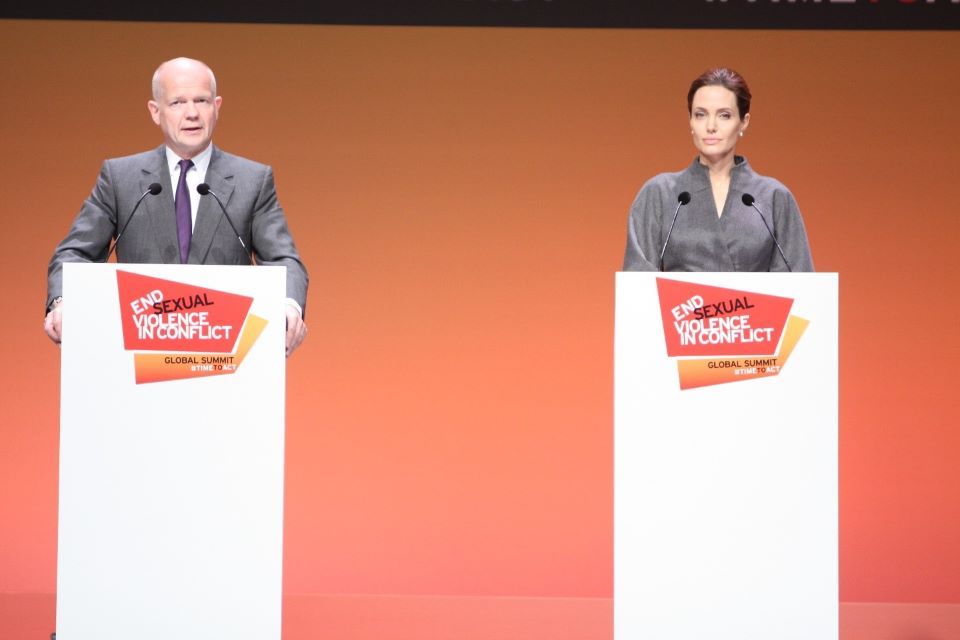
Lord William Hague and UNHCR Special Envoy Jolie speaking at the 2014 Global Summit
Since then, milestones include:
-
The 2013 UK-led UN Declaration of Commitment to End Sexual Violence in Conflict[footnote 5], which has been endorsed by 156 UN Member States.
-
The 2014 Global Summit to End Sexual Violence in Conflict, which was a milestone in bringing this issue to the world’s attention and encouraging others to act.
-
The International Protocol on the Documentation and Investigation of Sexual Violence in Conflict (launched in 2014 and updated in 2017)[footnote 5], which has been used to strengthen accountability around the world.
-
The 2017 Principles for Global Action: Preventing and Addressing Stigma Associated with CRSV7.
-
The 2018 PSVI Film Festival, where filmmakers from across the globe highlighted how film can be used as a powerful advocacy tool.
-
Following UK advocacy, NATO’s policy on CRSV in June 2021 outlines actions that NATO will take to prevent and respond to CRSV in its operations. On 25 May 2022 NATO agreed new military guidelines to put this policy into action.
-
The UK contributing £2.7 million to the Global Survivors Fund since its inception in 2019.
-
In April 2022, Lord Ahmad launched the Murad Code jointly with Nadia Murad at the UN Security Council. This code of conduct will help to ensure that the investigation and documentation of sexual violence crimes upholds survivors’ rights.
The UK is well placed to continue and step up its global leadership role in addressing CRSV. We have developed the right expertise and tools, including the PSVI Team of Experts and the International Protocol. The Integrated Review8 and International Development Strategy9 provide new frameworks to bring together our diplomacy, development and defence capabilities more coherently on this issue.
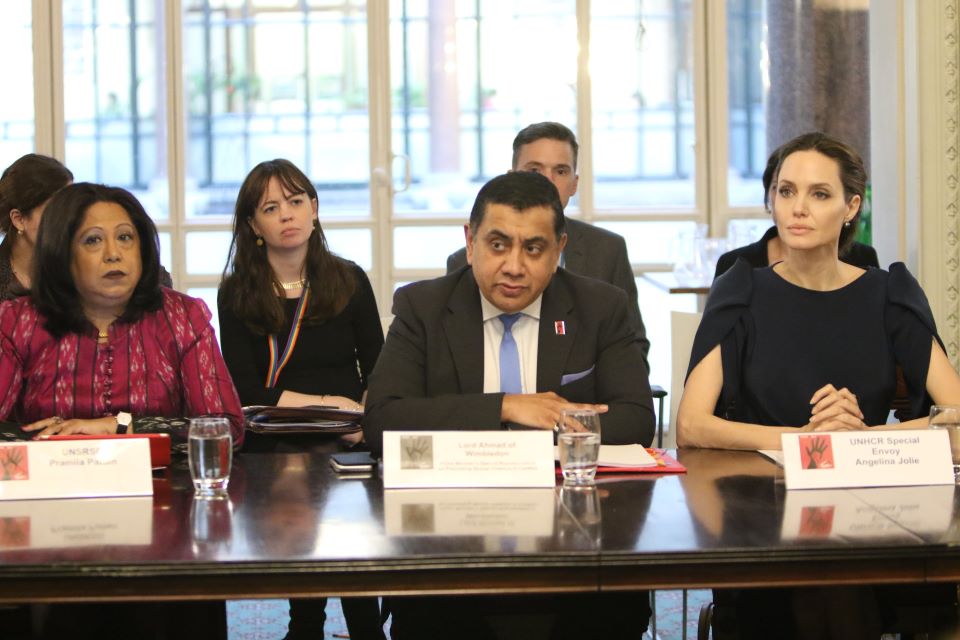
Lord Ahmad, Angelina Jolie and SRSG Patten at the PSVI Film Festival in 2018
Strategic approach
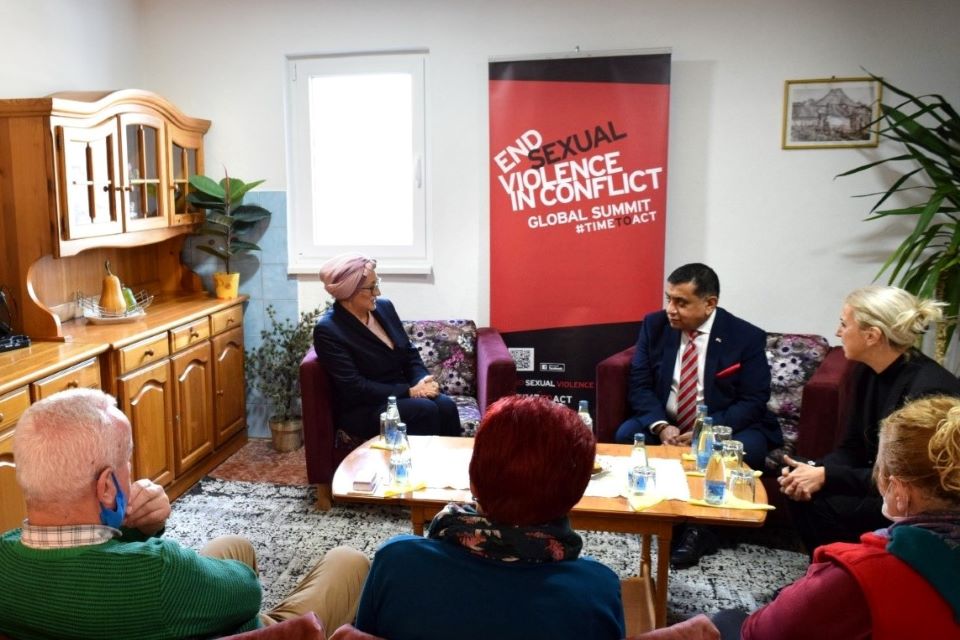
Lord Ahmad meets with survivors in Zenica, Bosnia and Herzegovina, 2021
Women and girls are at the centre of UK foreign and development policy. The PSVI Strategy will support delivery of the International Development Strategy, the UK’s Strategy on Tackling Sexual Exploitation, Abuse and Harassment (SEAH)[footnote 10], and the UK’s Women Peace and Security (WPS) National Action Plan (NAP)[footnote 11]. Tackling CRSV will be a key part of the UK’s upcoming NAP 2023-2027. The PSVI is also a core element of our work to improve the UK’s impact in conflict prevention and reduction, as set out in the Integrated Review.
The PSVI is part of the UK’s global leadership on tackling all forms of GBV, including through our flagship What Works to Prevent Violence programme; our leadership on safeguarding against SEAH; and our membership of the Call to Action on Protection from GBV in Emergencies. The strategy is underpinned by a robust, peer-reviewed theory of change (Annex B).
The strategy outlines four strategic objectives to guide PSVI’s work:
- Objective 1: Strengthen the global response to CRSV
- Objective 2: Prevent CRSV
- Objective 3: Strengthen pathways to quality justice for all survivors of CRSV and hold perpetrators to account
- Objective 4: Enhance support available to survivors and children born of sexual violence in conflict, including tackling the stigma they face within their communities
Delivery of these objectives will be supported by up to £12.5 million of new, dedicated funding for PSVI over the next three years. This funding will be complemented by wider CRSV programming across FCDO.
Harnessing UK expertise
The UK’s PSVI Team of Experts is a group of external specialists with a range of expertise in tackling CRSV, including in international law, gender-based violence and humanitarian responses. The PSVI Team of Experts will continue to be a key tool to deliver PSVI objectives across the world. We have deployed the Team of Experts over 90 times since 2012 to build the capacity of governments, the UN, and NGOs. Recent deployments have helped to address CRSV in the crises in Ethiopia and Ukraine.
We will use the UK’s analytical expertise to expand our understanding of how to tackle CRSV effectively. As outlined in the International Development Strategy, we will share lessons and evidence of what works with partners.
Focus countries
We will prioritise PSVI activity over the next three years in countries and regions affected by CRSV where the UK can have impact. Our focus countries have been selected based on four key criteria:
a) the level of need
b) UK influence and impact
c) host country political will
d) value for money
Seven countries have been selected: Bosnia and Herzegovina (BiH), Colombia, the Democratic Republic of the Congo (DRC), Ethiopia, Iraq, South Sudan and Ukraine. We will work with our embassies in focus countries to use diplomatic and development levers to advance PSVI objectives. These countries are not intended to be an exhaustive list, and we will continue to engage in other countries affected by CRSV. We also recognise that CRSV can occur along migration routes. We will review PSVI focus countries on an annual basis, taking into account the criteria listed above.
A survivor-centred approach
The UK remains dedicated to putting survivors of CRSV at the heart of our work. The PSVI follows a survivor-centred approach – in line with UN Security Council Resolution 2467 on CRSV[footnote 12] – and proactively involves survivors in determining what the UK’s approach and priorities should be, with all policies and practices following the ‘do no harm’ principle.
UK PSVI Survivor Champions
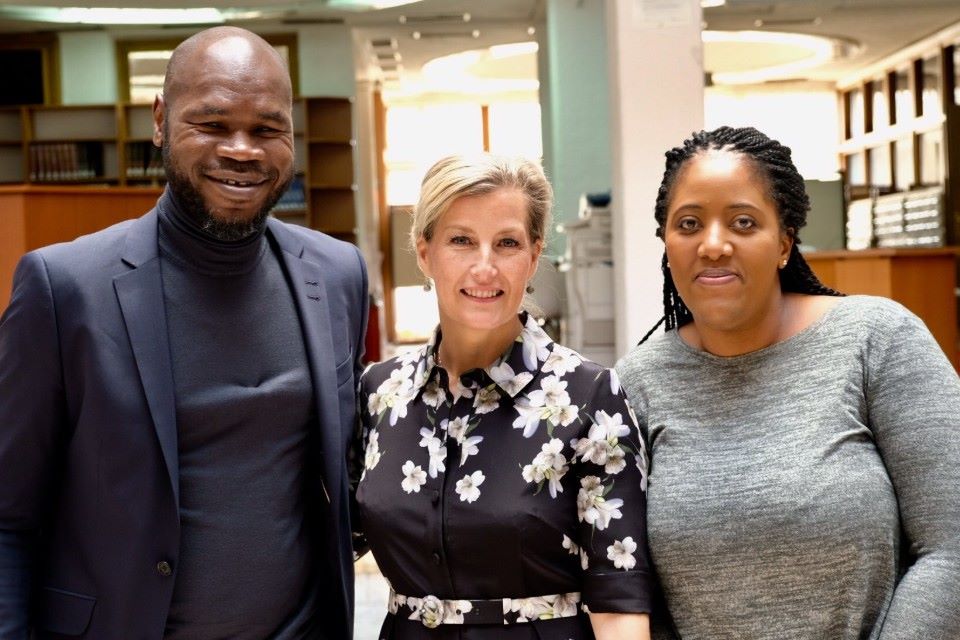
PSVI Survivor Champions Nadine Tunasi and Kolbassia Haoussou MBE with HRH the Countess of Wessex, 2019
Nadine Tunasi and Kolbassia Haoussou MBE were appointed in October 2019 to advocate for support for all survivors and children born of CRSV and are at the core of our approach to ensure survivors’ voices are included. We will continue to take a survivor-centred approach, including engaging with survivor networks on our policy initiatives. Survivor voices were central to the international conference in London in November 2022.
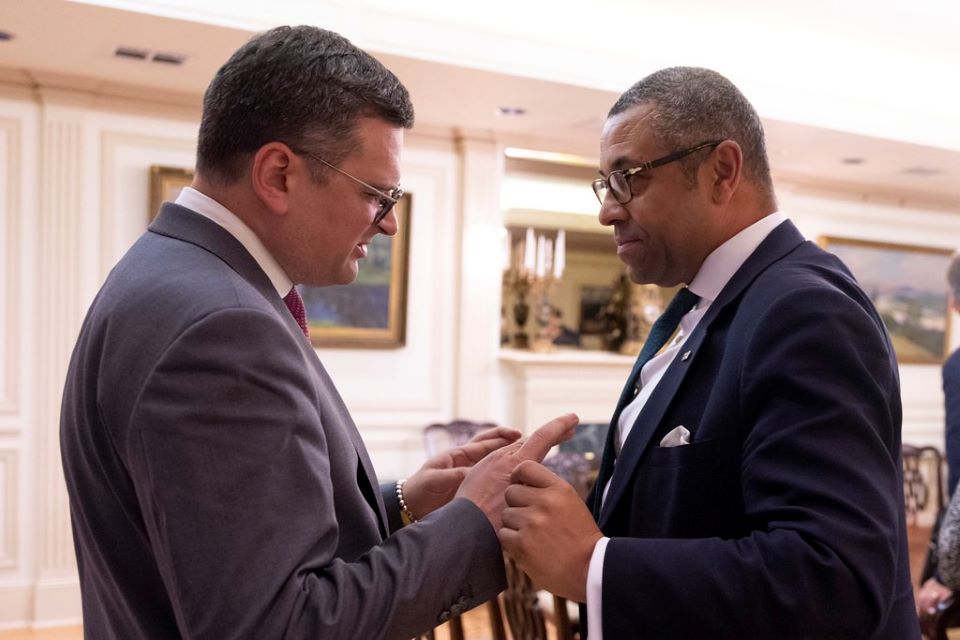
Foreign Secretary James Cleverly meets with Dmytro Kuleba, Ukraine Foreign Minister at the United Nations General Assembly (UNGA) in New York. Picture by Simon Dawson / No 10 Downing Street
Case study: CRSV in Ukraine
On 24 February, Russia launched a premeditated and wholly unprovoked invasion into Ukraine. Since then, we have been horrified by reports of rape and sexual violence committed by Russian armed forces in Ukraine. We have been clear that Russia’s barbaric acts must be investigated and those responsible held to account.
That is why the government worked with partners to refer the situation in Ukraine to the International Criminal Court, to establish a Commission of Inquiry through the UN Human Rights Council and, with the support of Ukraine, to establish an OSCE Mission of Experts. The UK will provide the necessary assistance to the ICC to support its investigations and has already given £1 million in addition to our usual annual contribution. In March, the Attorney General appointed Sir Howard Morrison as an Independent Adviser to the Ukrainian Prosecutor General.
In May, the UK deployed a team of war crimes experts, including a member of the PSVI Team of Experts, to the region to scope what support the UK could offer to investigations into Russian atrocities. The experts’ recommendations are forming the basis of our response.
On 25 May, the European Union, the United States, and the United Kingdom announced the creation of the Atrocity Crimes Advisory Group (ACA), a mechanism aimed at ensuring efficient coordination of their respective support to accountability efforts on the ground. The ACA will reinforce current EU, US and UK efforts to deliver accountability for atrocity crimes, including sexual violence, in the context of Russia’s ongoing war of aggression against Ukraine.
The UK has committed up to £2.5 million in this financial year to the ACA which includes:
- deployment of Mobile Justice Teams to the scene of war crimes
- deployment of UK experts to train prosecutors and the police in handling CRSV cases and supporting survivors
- training up to 90 judges in war crimes prosecution and management
The UK is championing efforts to address GBV, including CRSV, and provide life-saving support to survivors in Ukraine. We are funding humanitarian partners through the Ukraine Humanitarian Fund and the International Federation of the Red Cross to provide a range of protection services. This support is delivered via funding already committed against the £220 million allocation for humanitarian assistance and through core funding including to the UN Central Emergency Response Fund. We are funding the UN Population Fund (UNFPA) to support survivors, including through mobile medical clinics. We have also procured 30,000 forensic medical kits and specialised equipment to enable effective forensic examination of CSRV cases by Ukrainian authorities.
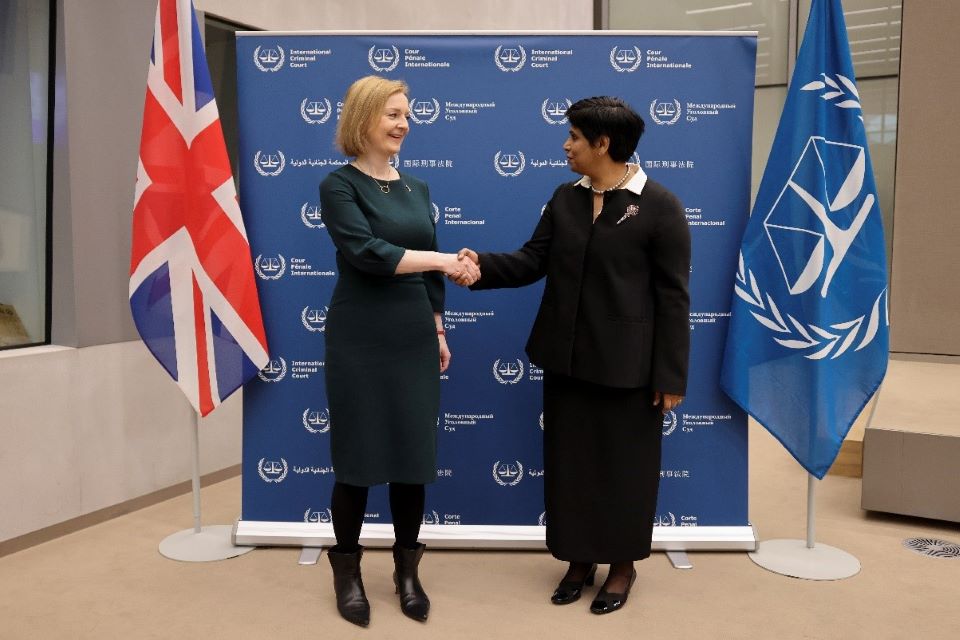
Liz Truss, former Foreign Secretary, meets ICC Deputy Prosecutor Nazhat Shameem during an April 2022 visit to The Hague where she announced the UK’s deployment of a team of war crimes experts to scope what support the UK could offer to investigations into Russian atrocities © Tim Hammond/No 10 Downing Street
Implementing the strategy
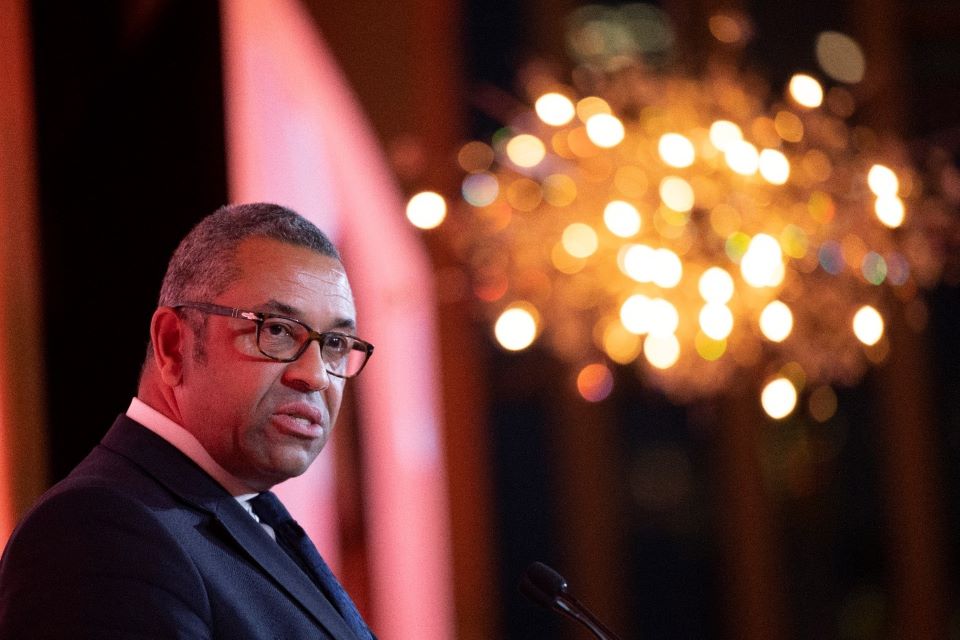
Foreign Secretary James Cleverly speaks during a fundraising event for Ukraine in the margins of the UN General Assembly in New York. © Simon Dawson/No 10 Downing Street
Objective 1: Strengthen the global response to conflict-related sexual violence
The UK will engage with international partners to deliver a step-change in the global response to CRSV and put an end to these heinous acts.
We hosted a Foreign Minister-level conference in November 2022 to galvanise stronger global action. States attending the conference agreed a new Political Declaration to raise the bar on tackling CRSV. The Declaration features tangible commitments from the UK and other governments, which we are now working with partners to deliver.
We continue to encourage other states to appoint special representatives on CRSV. A network of senior advocates working together across the globe could be transformational in turning the dial of the international response.
We will drive further concerted action on the Crimes Against Humanity Convention, which will strengthen the international legal architecture and contribute to prosecutions of atrocity crimes including some forms of CRSV.
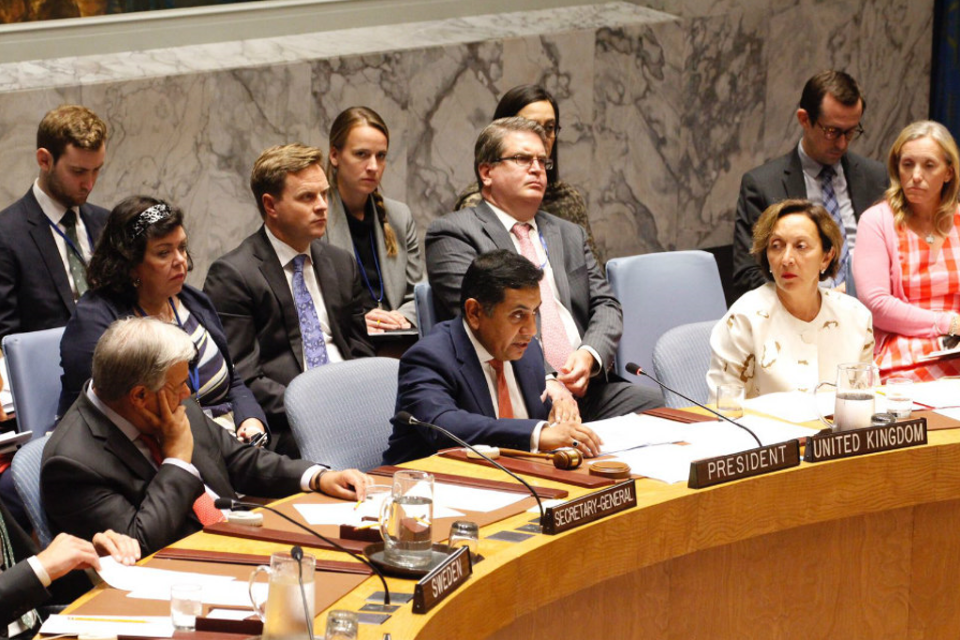
Lord Ahmad speaks at the UN Security Council on the plight of Rohingya refugees, 2018
The UK will also remain a champion of the Call to Action on Protection from GBV in Emergencies, an initiative that works to transform the way GBV is addressed in humanitarian emergencies.
Partnerships with multilateral institutions will continue to be a key part of UK efforts. We will maintain a close working relationship with the UN Special Representative of the Secretary-General (SRSG) on Sexual Violence in Conflict, as well as other UN agencies and bodies. As permanent members of the UN Security Council, we will continue to push for a stronger global response to CRSV.
We will work with Security Council members to ensure that UN peacekeeping mandates reflect the impact of conflict on women and girls, including through advocating for the use of civilian and uniformed gender advisers to address the needs of survivors of sexual and gender-based violence in conflict and working with the UN Secretary General on the implementation of the Special Measures on Sexual Exploitation and Abuse. We will prioritise strengthening women’s participation in all peace efforts in accordance with UN Security Council Resolution 1325 and associated resolutions.
The UK is proud to support Canada’s Elsie Initiative to promote uniformed women in peacekeeping operations. We will continue to champion the use of barrier assessments to highlight obstacles preventing our armed forces from training and deploying larger numbers of uniformed female personnel.
The UK was central to developing a new NATO policy on CRSV, which was endorsed by NATO Leaders in June 2021. This policy requires that: NATO missions build CRSV prevention and response into their planning; deploying NATO forces receive training on addressing CRSV; and that NATO may provide emergency first response if necessary. On 25 May 2022 NATO agreed new military guidelines to put this policy into action. The UK will work with Allies to ensure effective implementation of this policy, including through providing resources to NATO’s Human Security Office.
We will work with G7 partners to implement the commitments made by G7 leaders at Carbis Bay (2021) and Elmau (2022) to tackle CRSV. This includes commitments to improve accountability and to consider how to strengthen the international architecture around CRSV. We will also work through other multilateral organisations to advance PSVI objectives, including the G20 and the OSCE.
Objective 2: Prevent CRSV
Addressing the root causes of CRSV – such gender inequality – is critical for a strategic approach to prevention.
As outlined in the International Development Strategy, we will take a patient and strategic approach to progress, supporting partners to promote gender equality and tackle gender-based violence. We have committed £67.5 million to the What Works to Prevent Violence: Impact at Scale programme to respond to the urgent need to scale up Violence Against Women and Girls (VAWG) prevention. The programme will contribute to generating a world-class evidence base on what works to prevent CRSV.
Case study: What works to prevent violence
The UK’s flagship £25 million What Works to Prevent Violence research and innovation programme (2013-20) generated an extensive body of evidence from across 16 countries in Africa and Asia to understand the underlying causes of VAWG and what works to prevent it. The programme found that VAWG escalates in scale and severity in conflict and crisis, with up to 73% of women and girls in the South Sudan study experiencing physical and/or sexual violence at the hands of an intimate partner in their lifetime.
Despite the scale of the problem, rigorous evaluations showed that VAWG is preventable, even during conflict. For example, a What Works intervention in the DRC achieved significant reductions in violence of up to 50% in less than three years. The project worked with faith leaders and the wider community through ‘community conversations’ with the aim of tackling the root causes of violence, including gender inequality.
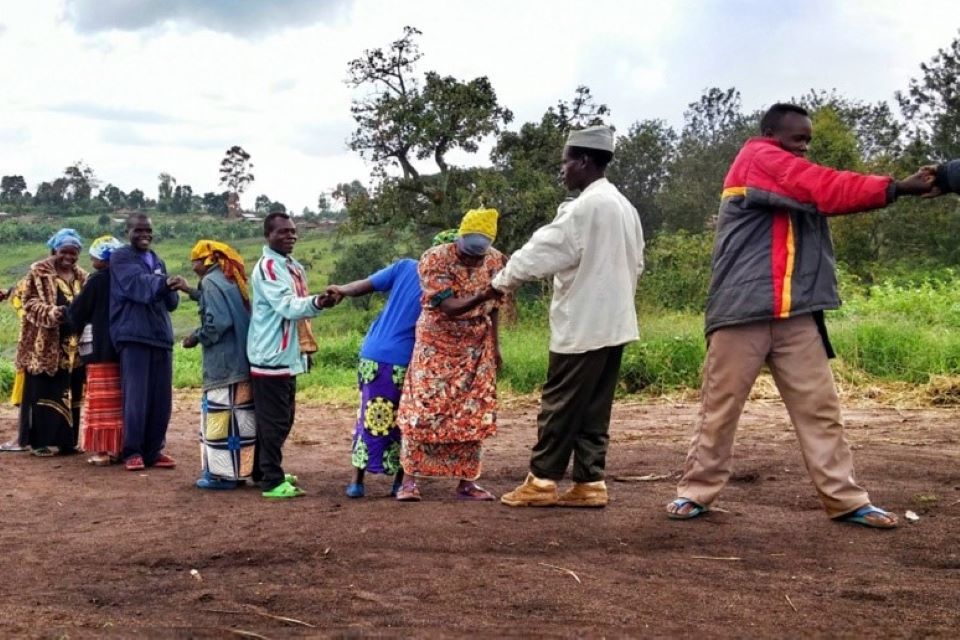
Training faith leaders and gender champions in Libi on Transforming Masculinities © Uwezo Baghuma, HEAL Africa
Women-led and women’s rights civil society organisations play a critical role in preventing violence and supporting survivors. The UK Government will continue to support these organisations, including through our long-term partnership with the UN Trust Fund to End Violence Against Women (UNTF) and the UN Trust Fund in Support of Victims of Sexual Exploitation and Abuse.
We will work to reduce the emergence, duration and intensity of conflict, including by addressing the gender inequality that can drive conflict, and thereby reduce the prevalence of associated GBV, including sexual violence. The UK will work to address the long-term drivers of conflict and atrocities through support for gendersensitive monitoring systems and a focus on the political dynamics that drive violence. We will also support the UN’s unique role in conflict prevention and peacebuilding and provide support to other relevant regional or international institutions.
The UK Ministry of Defence will continue to embed a Human Security approach across all UK Defence activity, in line with its Human Security policy[footnote 13] which was published in December 2021. This individual and community-focused approach ensures context and gender-sensitive planning, facilitating a deeper understanding of the vulnerabilities of communities and the operating context. It enables the UK Armed Forces to be more responsive to human security concerns, with a more comprehensive understanding of conflict drivers and dynamics, including CRSV.
As part of this, the UK will continue to provide Human Security training to the Armed Forces of partner nations, which will include raising awareness of CRSV. Additionally, our own training programmes ensure that all UK military personnel deploying on operations receive Human Security awareness training.
The British Peace Support Team (Africa), an integrated British Army and civilian team, will continue developing the capacity of multilateral organisations and bilateral African partners to strengthen peace support operations, including in addressing CRSV.
We will seek to use both UN and UK sanctions regimes to deter CRSV perpetrators. There are currently eight UN sanctions regimes (Central African Republic, the DRC, Libya, Mali, Somalia, South Sudan, Yemen and Al-Qaeda/Daesh) that contain designation criteria relating to CRSV. The UK’s Global Human Rights Sanctions regime allows us to impose sanctions on those involved in serious human rights violations and abuses, including those who commit CRSV.
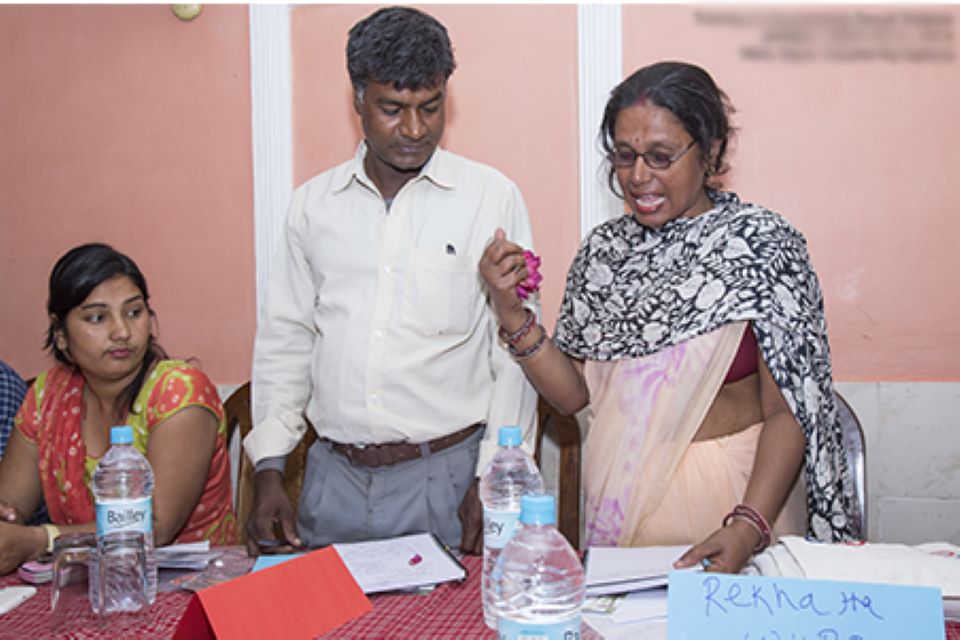
Participants of training in Nepal on “How to document sexual violence” provided by TRIAL International © Kaushal Saptoka
Objective 3: Strengthen pathways to quality justice for survivors of CRSV and hold perpetrators to account
The UK will work with partners to strengthen national and international justice.
As part of this we have launched a new initiative for CRSV accountability – A.C.T (Accountability Commission & Taskforce) for Survivors that will strengthen the ability of national authorities to tackle impunity through:
- building an understanding of the barriers to delivering justice and accountability, particularly in contexts where there is a high prevalence of CRSV
- supporting the capacity of national justice mechanisms to investigate and deliver justice and accountability through providing expertise, including through bringing together best practice, guidance and toolkits
- taking a survivor-centred approach to delivering justice and accountability, including addressing the stigma survivors face and recognising the importance of a wide range of accountability measures
As part of the new initiative, we are supporting the Mukwege Foundation to develop a guidebook on ‘The Law of State Responsibility for CRSV’, which will help States understand their existing obligations under international law to prevent and respond to CRSV.
We will work with the Ukrainian Government to deliver justice for survivors following the terrible reports of rape and sexual violence committed by Russian forces in Ukraine, including through the work of the Atrocity Crimes Advisory Group. We will also learn from the war in Ukraine, which is demonstrating what can be achieved when there is a strong international commitment to justice.
We will promote adherence to the Global Code of Conduct for Investigating and Documenting CRSV[footnote 14] (the ‘Murad Code’) for all organisations gathering information from CRSV survivors, and will review how the Murad Code can strengthen UK Government practice. The UK-funded Murad Code was developed by the Institute for International Criminal Investigations with support from Nadia’s Initiative and other partners. The Murad Code will help to ensure that CRSV survivors’ experiences are documented in a safer and more effective way, enhancing the protection of survivors’ human rights.
Working with legal and design experts, we will use the Murad Code in an innovative project exploring how new technologies, such as virtual reality, could address challenges faced by survivors when seeking justice, including stigma, re-traumatisation, and threats of violence from perpetrators.
We will support the development of a Sexual Violence and Stigma in Criminal Justice Systems and Courts Assessment Toolkit. This will tackle the stigma survivors face in criminal justice systems by providing tools for assessing and addressing this stigma. This will contribute to better justice outcomes and safer interactions with survivors.
We will continue to support the UN Team of Experts, which helps national authorities to tackle CRSV and bring perpetrators to justice. We will continue to promote the use of the International Protocol on the Documentation and Investigation of Sexual Violence in Conflict. The Protocol is designed to help strengthen the evidence for bringing perpetrators to justice, thus overcoming one of the key barriers to tackling impunity for CRSV.
Case study: TRIAL International
In 2021 to 2022 the UK was proud to support TRIAL International, a non-governmental organisation fighting impunity for international crimes and supporting survivors in their pursuit of justice. UK funding enabled support for over 400 survivors of CRSV from the DRC, Nepal and Bosnia and Herzegovina in their quest for justice. Support included investigation and documentation of cases, access to free legal assistance and tailored support for survivors. TRIAL’s advocacy, research and knowledge sharing has helped strengthen national and international structures to deliver more effective accountability.
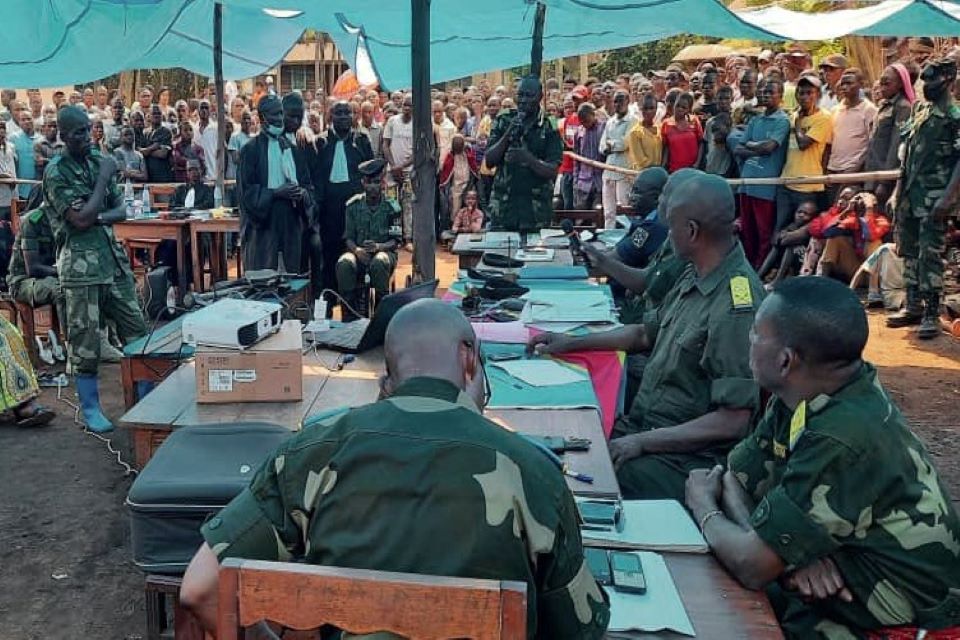
Mobile courts, which allow the court to sit in the areas where the crimes were committed, are regularly used in the DRC © Guy Mushiata/TRIAL International
The UK will continue to support the work of the International Criminal Court (ICC) to prosecute the most serious crimes of international concern, including those involving CRSV, by ensuring it has sufficient resources and the most experienced and qualified judges.
Case study: Launching the Murad Code at the UN Security Council
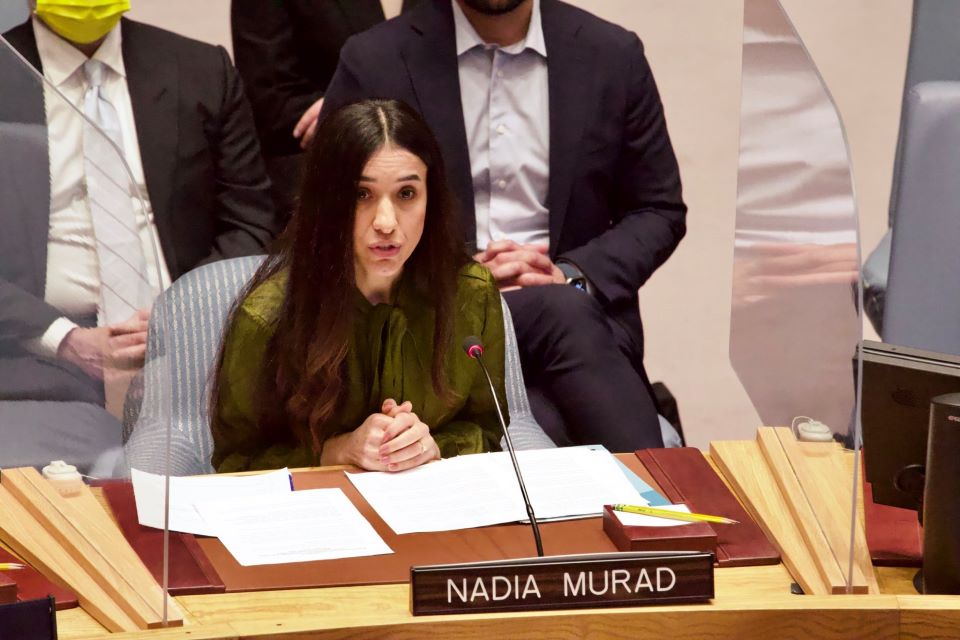
Nobel Peace Prize laureate Nadia Murad launches the Murad Code at the UNSC, April 2022
On 13 April 2022, the UK chaired a UN Security Council Open Debate on CRSV as part of its Presidency. Lord Ahmad and Nadia Murad used this global platform to launch jointly the Murad Code, maximising the publicity for this important tool. Nadia Murad spoke powerfully on the need for those documenting sexual violence to understand and uphold survivors’ rights. Lord Ahmad encouraged everyone involved in this work, including states, multilateral agencies and civil society, to ensure that their practices are compliant with the standards set out in the Murad Code.
Objective 4: Enhancing support available to survivors and children born of sexual violence in conflict (including tackling the stigma they face within communities)
The UK will support civil society organisations that provide vital services such as healthcare and psychosocial support. We will work to tackle the stigma too often faced by survivors and children born of CRSV in line with the UK-funded 2017 Principles for Global Action.
We will contribute up to £5.15 million over the next three years to the Global Survivors Fund (GSF), which works with governments and local organisations to provide redress for survivors of CRSV. This allows financial and psychosocial support for thousands of survivors in countries such as the DRC, while also contributing to the evidence base. As a Board member, the UK has a leading role in shaping the strategic direction of the Fund.
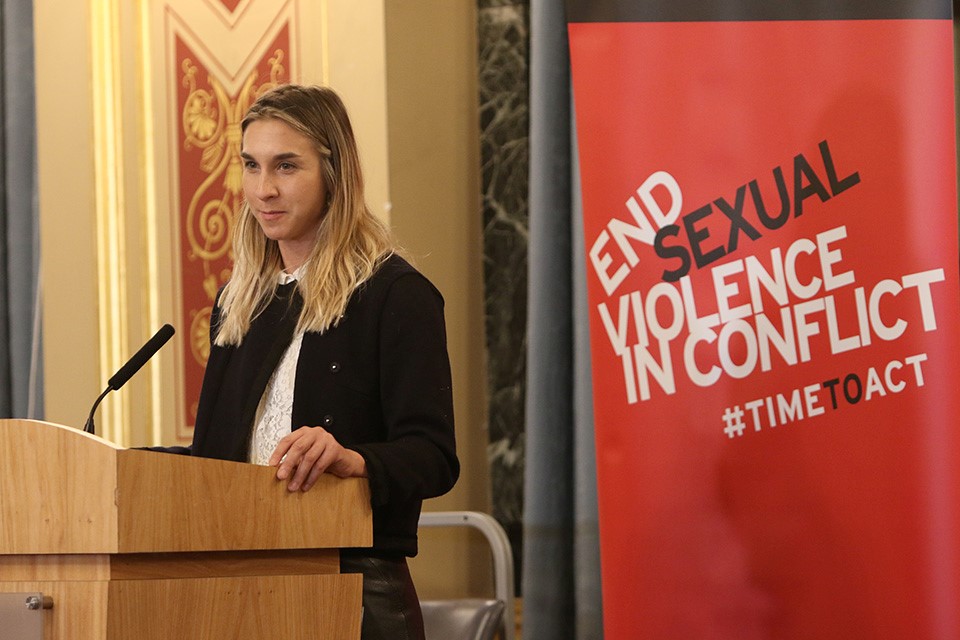
Lejla Damon, who was born as a result of sexual violence in Bosnia and Herzegovina, speaks at the launch of the Call to Action to Ensure the Rights and Wellbeing of Children Born of Sexual Violence in Conflict, 22 November 2021
We will build support from countries and civil society for the UK-led Call to Action to Ensure the Rights and Wellbeing of Children Born of Sexual Violence in Conflict[footnote 15]. The Call to Action was launched on 22 November 2021 and has been formally endorsed by eleven Governments, including the US, Canada, South Sudan, the DRC and Mexico, as well as the SRSGs on sexual violence in conflict, children and armed conflict, and violence against children. The UK will continue to work closely with those who have endorsed through the Platform for Action Promoting the Rights and Wellbeing of Children Born of CRSV, a framework for implementing the principles in the Call to Action. A complementary handbook will provide tools for government signatories to review their laws, policy and practice in line with their commitments. Together, the Call to Action and Platform for Action seek to galvanise commitment and accountability from governments, donors, UN agencies, NGOs, faith leaders, and others to address the needs of children born of CRSV.
We will continue to promote the Declaration of Humanity[footnote 16] to secure further signatories and ensure its principles are put into practice in affected communities in PSVI focus countries and more widely. The Declaration has been endorsed by approximately 200 faith leaders in a range of countries, including the DRC, South Sudan, Sri Lanka, the Vatican, Kosovo, and Iraq.
Case study: Declaration of Humanity
The Declaration, the first of its kind, calls for the prevention of sexual violence in conflict and denounces the stigma faced by survivors. It unites multiple faiths and beliefs in a common front to challenge damaging societal norms and calls for support for survivors of sexual violence internationally. In 2021 and 2022, the UK funded community dialogues on the principles of the Declaration of Humanity, led by religious leaders in the DRC and South Sudan. These dialogues aimed at tackling those faith narratives that contribute to the stigmatisation of CRSV survivors.
The UK will continue to invest in life-saving comprehensive sexual and reproductive health services to support survivors of GBV, including CRSV, in conflict and post-conflict countries. The UK has committed to considering SRHR in all our humanitarian funding. We will support the provision of SRHR supplies and services through our partnerships and our global advocacy on SRHR preparedness and response. This includes our continued support for the rollout of the Minimum Initial Service Package on reproductive health at the outset of humanitarian crises.
We will also continue to advocate for the universal endorsement and implementation of the Safe Schools Declaration. We will support programmes that deliver safe education in emergencies and protracted crises and include psychosocial support for victims of sexual violence.
We will step up our international leadership to tackle child, early and forced marriage. This work will be supported through the second phase of our commitment to the UN Global Programme to End Child Marriage.
Case study: Global Survivors Fund
Rather than prioritising justice in the courts, many survivors seek support such as access to health services, employment, help with education or recognition by the state of atrocities that occurred. As a result, Nobel Peace Prize Laureates Dr Denis Mukwege and Nadia Murad launched the Global Survivors Fund (GSF) in October 2018. The GSF provides wider forms of redress for CRSV survivors. Projects are developed hand in hand with survivors to truly reflect their needs and help them achieve the redress they seek.
The Fund’s Global Reparations Study outlines the status of redress for survivors in over 20 countries and makes concrete recommendations for further action. The GSF also provide tailored technical guidance to governments to support the implementation of such recommendations. The UK has provided £2.7 million to the GSF since its inception and joined the GSF Board in 2021.
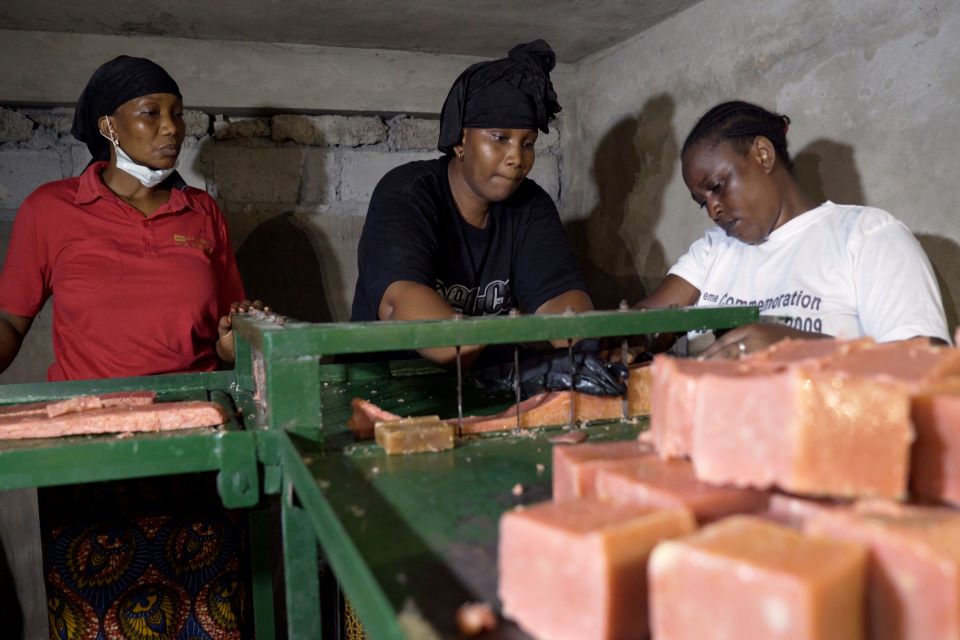
GSF survivor in Guinea, Conakry, after receiving interim reparative measures, 2021 © Gazelle Gaignaire
Key partners
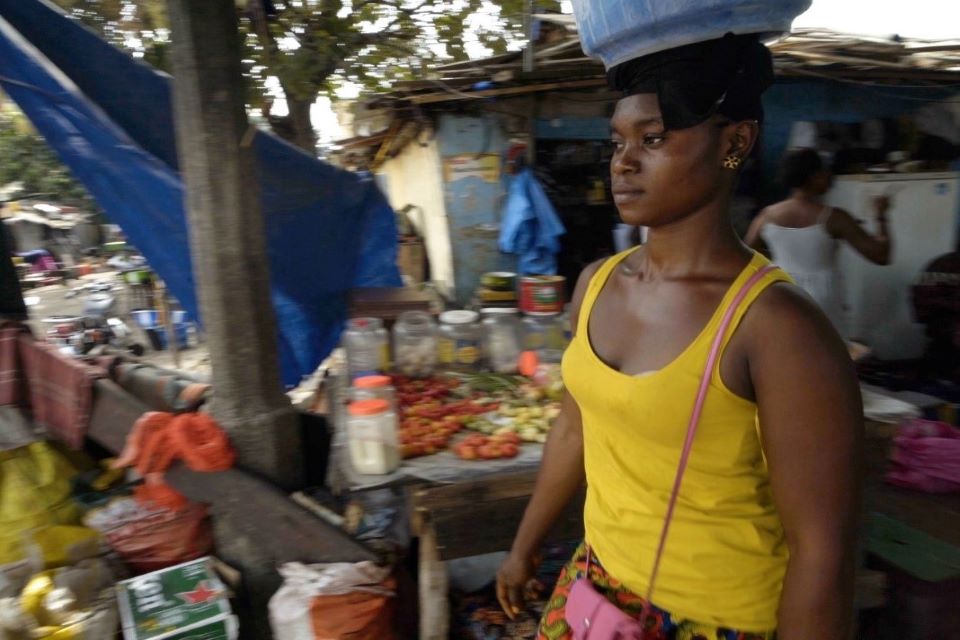
A survivor in Guinea, Conakry, after receiving interim reparative measures, 2021© Gazelle Gaignaire
UK Government
The UK is the only government to have a Prime Minister’s Special Representative for Preventing Sexual Violence in Conflict. The current Special Representative is Lord (Tariq) Ahmad of Wimbledon (2017 to present). Previous incumbents were Lord Hague (2012 to 2015) and Baroness Anelay of St Johns (2016 to 2017).
The PSVI team in the FCDO leads action across the department and maintains strong links with others in government, including the Ministry of Defence, Home Office, and Cabinet Office.
Wider partners
Lord Ahmad chairs the PSVI Steering Board with parliamentarians, NGOs, survivors, academics and other experts. We will continue to work closely with HRH the Countess of Wessex on the WPS and PSVI agendas.
PSVI works closely with parliamentarians, including members of the All-Party Parliamentary Group on PSVI and the House of Lords Select Committee on Sexual Violence in Conflict.
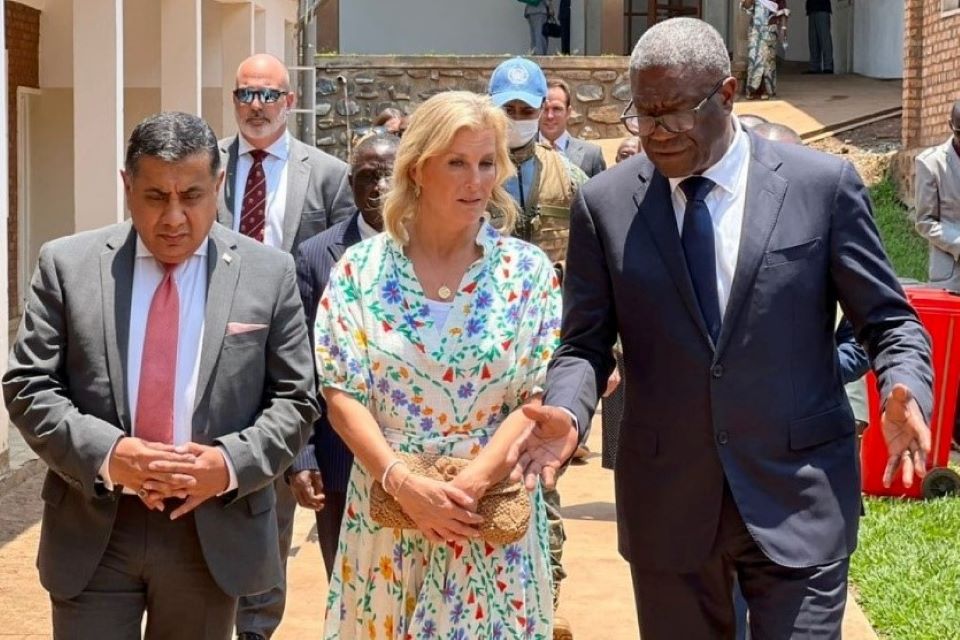
Lord Ahmad and HRH the Countess of Wessex visit Dr Mukwege and the Panzi Hospital in DRC © Associated Press
Case Study: Women’s Integrated Sexual Health (WISH) programme
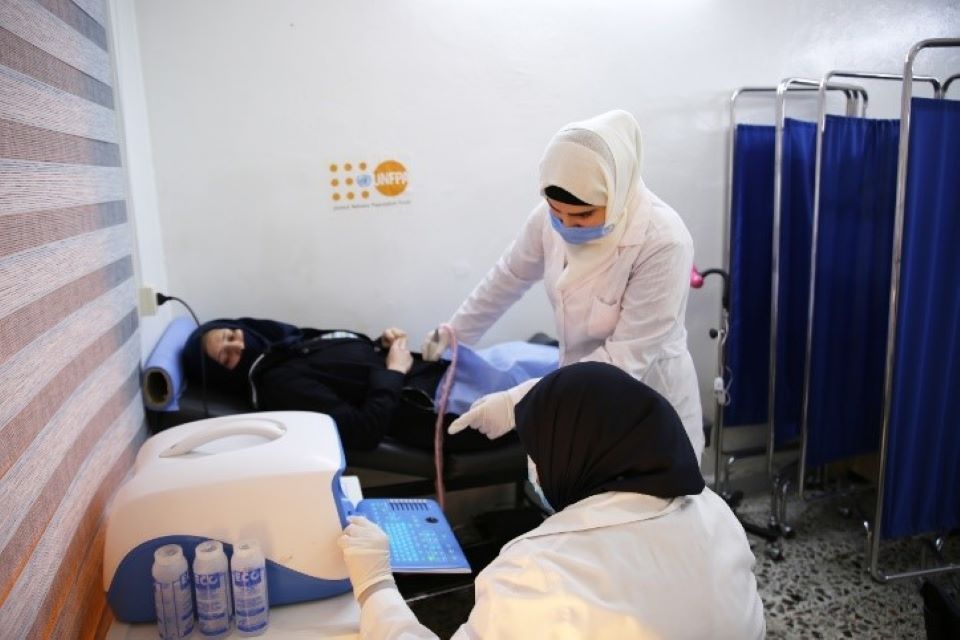
An expectant mother undergoes a routine ultrasound at a UNFPA clinic in Syria © UNFPA Syria
The multi-country Women’s Integrated Sexual Health (WISH) programme includes funding for the International Rescue Committee and their partners to deliver sexual and reproductive health services to refugees and displaced populations. The UK’s support to the UNFPA Supplies programme includes the provision of emergency reproductive health kits in fragile and conflict-affected settings.
Annex A: acronyms
| Acronym | Definition |
|---|---|
| ACA | Atrocity Crimes Advisory Group |
| BiH | Bosnia and Herzegovina |
| CRSV | Conflict-related sexual violence |
| DRC | Democratic Republic of the Congo |
| GBV | Gender-based violence |
| GSF | Global Survivors Fund |
| ICC | International Criminal Court |
| NATO | North Atlantic Treaty Organisation |
| OSCE | Organisation for Security and Cooperation in Europe |
| PSVI | Preventing Sexual Violence in Conflict Initiative |
| SEAH | Sexual exploitation and abuse and harassment |
| SRHR | Sexual and reproductive health and rights |
| SRSG | Special Representative of the Secretary General |
| UNFPA | United Nations Population Fund |
| UNICEF | United Nations Children’s Fund |
| UNHCR | United Nations High Commissioner for Refugees |
| UNSC | United Nations Security Council |
| UNTF | UN Trust Fund to End Violence Against Women |
| VAWG | Violence Against Women and Girls |
| WISH | Women’s Integrated Sexual Health programme |
| WPS | Women, Peace and Security |
-
https://www.un.org/en/preventgenocide/rwanda/assets/pdf/Backgrounder%20Sexual%20Violence%202014.pdf (PDF, 110.44KB) ↩
-
Information provided by FCDO partner ↩
-
https://insights.careinternational.org.uk/media/k2/attachments/What-Works_Intersections-of-VAWG-with-SBPB-report_2018.pdf (PDF, 3.25MB) ↩
-
https://www.gov.uk/government/publications/a-declaration-of-commitment-to-end-sexual-violence-in-conflict ↩ ↩2
-
https://www.gov.uk/government/publications/uk-strategy-safeguarding-against-sexual-exploitation-and-abuse-and-sexual-harassment-within-the-aid-sector ↩
-
https://www.gov.uk/government/publications/uk-national-action-plan-on-women-peace-and-security-2018-to-2022 ↩
-
Resolution 2467 (2019) – United Nations Office of the Special Representative of the Secretary-General on Sexual Violence in Conflict ↩
-
https://www.gov.uk/government/publications/human-security-in-defence-jsp-985 ↩
-
https://www.gov.uk/government/publications/ensuring-the-rights-and-wellbeing-of-children-born-of-sexual-violence-in-conflict-call-to-action ↩
-
https://www.gov.uk/government/publications/declaration-of-humanity-by-leaders-of-faith-and-leaders-of-belief ↩
